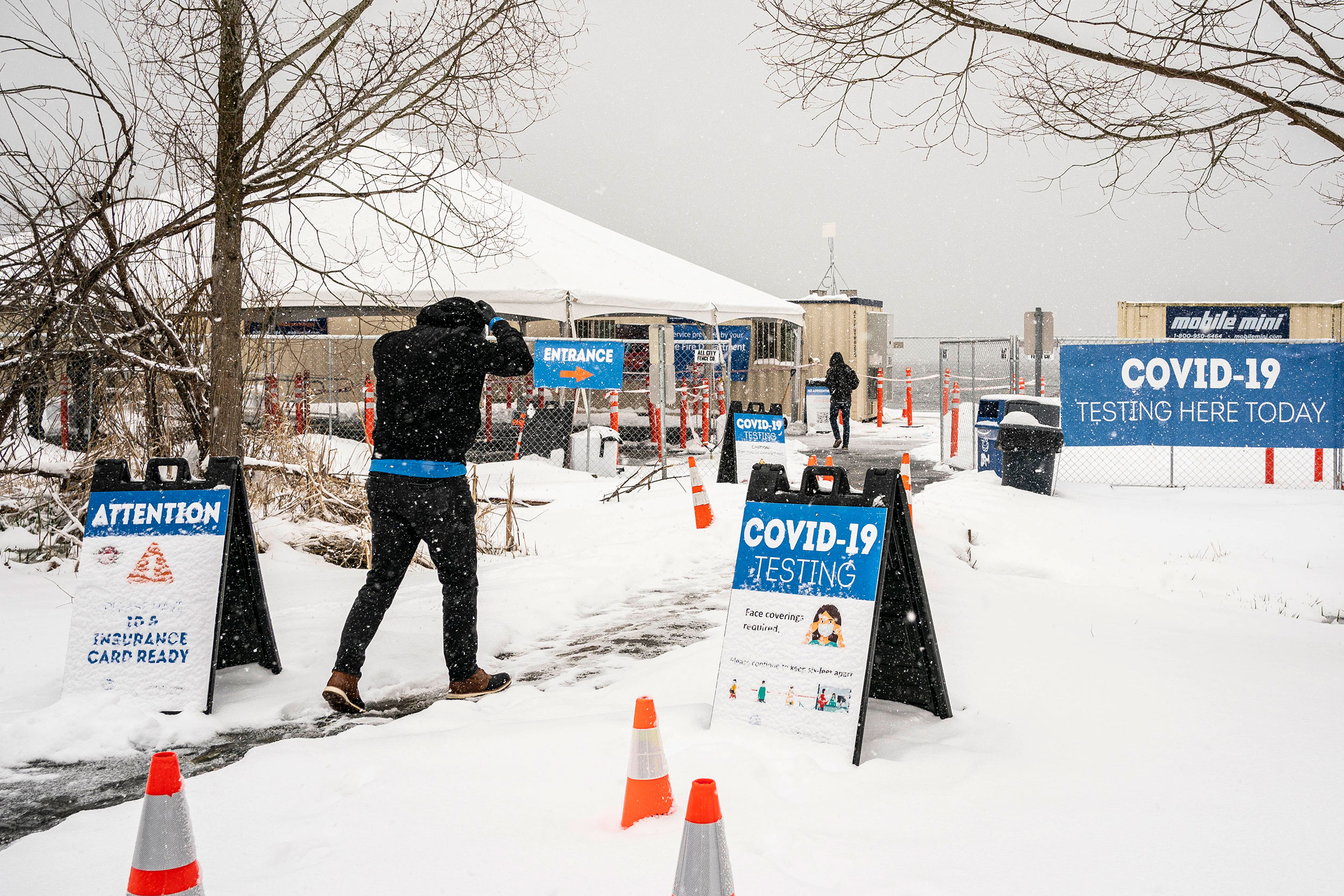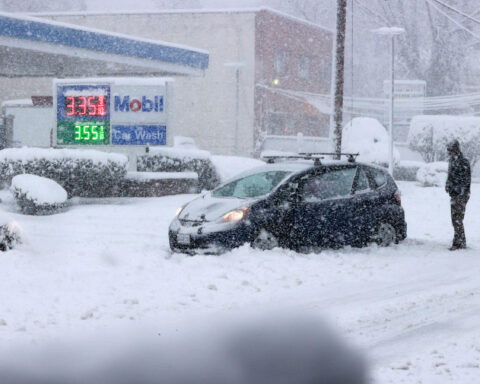As millions of people across the United States continue to weather a deadly winter storm without power, forecasts predict ice and low temperatures could be ahead for some of the worst-hit states.
“Swaths of half an inch of ice will be possible” over the next three days for areas from Texas to Mississippi and up through Virginia, according to the National Weather Service. “All severe weather hazards will be possible including a couple of tornadoes” from the Florida Panhandle to the coastal Carolinas Thursday, NWS said.
This comes as states with typically mild winters — including Texas, Oklahoma, Mississippi, and Kentucky — are already facing hazardous roads, power outages and water shut offs from the winter storms. The weather has led to at least 26 deaths, including three people who died in carbon monoxide related incidents and one driver who hit a snowplow.
The current round of winter weather is underway in the southern Plains, and will continue to develop as it pushes winter weather into the Northeast. Then the warming trend will begin in Texas this weekend, and moderate for the rest of the regions that have been impacted by the frigid temperatures, CNN meteorologist Michael Guy said.
Many of those who will face the harsh temperatures are among the nearly 3.5 million customers who are still in the dark, according to PowerOutage.US.
With demand for electricity at an “all-time high,” New Orleans has had to prepare for rolling power outages until midnight Wednesday, according to NOLA Ready, the City of New Orleans emergency preparedness campaign.
In the state with nearly 3 million of the country’s outages, chief executive officer of the Electric Reliability Council of Texas (ERCOT) Bill Magness said he doesn’t know for certain when power could return to customers.
“We can’t let ourselves tumble into a situation where, by acting prematurely — I hate to say it because it’s been such a long event– but by acting prematurely to completely close it off that we end up in that blackout that could last, you know, an indeterminate amount of time,” Magness said.
Injuries and destruction
Along with outages, the severe weather has brought destruction, injuries and even death.
Tulsa, Oklahoma, reported more than 100 water main and service line breaks due to the arctic conditions, according to the Waterline Break Board on the City of Tulsa’s website.
“Water line breaks in Tulsa are creating dangerous conditions,” Tulsa Police tweeted with a photo of a parked patrol car that became stuck when a water line broke and the water froze around the vehicle’s wheels.
As of Monday, 123 people were hospitalized across the state with weather-related injuries.
A strong winter storm in Portland has caused “catastrophic destruction” to the city’s electric system, Portland General Electric said late Tuesday night in a post on social media. The power company said there are at least 8,493 wires down and at least four substations are out.
“A series of historic storms has hit our communities, bringing three waves of snow, ice and wind. As each storm rolls in, more ice builds up on trees and power lines, that causes more and more trees and power lines to fall,” the company said in a post on their website.
Officials have warned residents that the conditions make the roads treacherous, and deadly traffic incidents have been reported.
One person in Medina County, outside of Cleveland, was killed when they hit a snowplow with their vehicle, Ohio’s Transportation Director, Jack Marchbanks, announced Tuesday.
According to the director, 11 snowplows have been hit in Ohio just in the past two weeks, compared to eight hit all last winter. “So it’s very treacherous out there,” Marchbanks said.
In North Carolina, the larger weather system produced a tornado that ripped through Brunswick County on Monday, killing three people and injuring 10 others, officials said.
“We had very minimal warning,” Edward Conrow, Brunswick County’s Director of Emergency Services told reporters at a press conference Tuesday. “We had a tornado warning from the National Weather Service that was broadcast, but at that time the storm was already on ground, causing damage.”
Travel conditions have also led to 9,210 canceled flights Monday to Thursday, according to FlightAware.com
Weather delays Covid-19 vaccinations
Weather hazards have also caused roadblocks in the nation’s battle against the coronavirus pandemic.
States spanning from Colorado to Georgia have delayed their shipments or vaccination appointments due to the weather conditions.
Impacts to a vaccine distribution hub in Tennessee will delay shipment of doses to Colorado and other states, according to Colorado State Joint Information Center. Ohio was expecting shipments directly from Pfizer and Moderna that will be delayed one to two days due to the severity of the weather, Gov. Mike DeWine said Tuesday.
Many healthcare providers in Georgia are rescheduling their vaccination appointments due to the delays, but when they can reschedule them will depend upon when shipments resume, which could come next week, the Georgia Department of Public Health said Tuesday.
Vaccines that are being delivered to Illinois will be directed to its “Strategic National Stockpile Receipt, Store, and Stage site” in anticipation of such delays, according to a state press release.
Texas mayor spent 38 hours without heat or water
Texas has suffered the brunt of the storm, and many there are suffering the freezing temperatures with no power to heat their homes.
Fort Worth Mayor Betsy Price told CNN Tuesday night that she was been without power or water for around 38 hours.
“It got down to a record low last night, two degrees below,” Price said. “So, it is really cold, and this is Texas, North Texas. We don’t get this kind of weather. People don’t always have the clothing for it, and certainly don’t drive in it very well.”
“If people have neighbors that they know don’t have heat and maybe they do, offer to take them in, let’s watch out for each other, let’s try to do the right thing by helping, share what we have,” the mayor urged residents. Price says the city has the resources to open more shelters if needed and will evaluate the situation hour by hour.
For residents who are homeless and can’t be served by shelters, Waco, Texas, is providing 15 hotel rooms for six nights, said Mayor Dillon Meek.
“This is not a sustainable solution but helps keep vulnerable persons from sheltering in single digit temperatures.”




